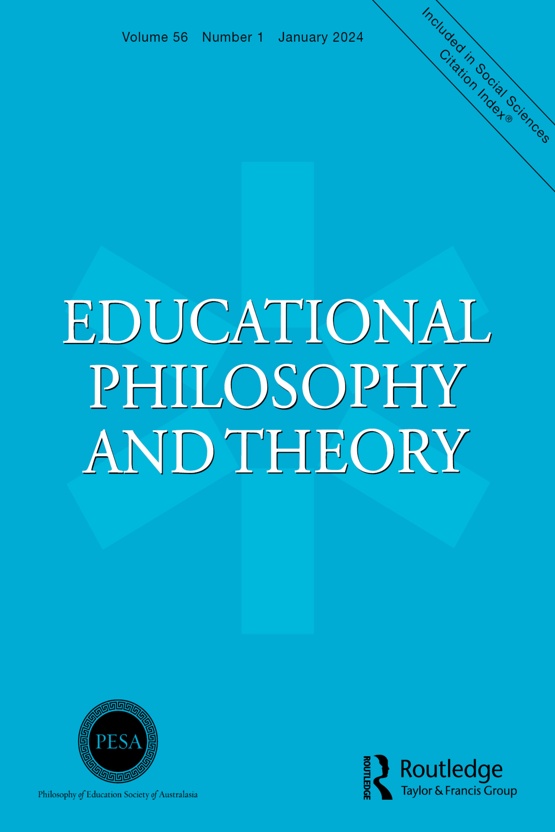Submit a Manuscript to the Journal
Educational Philosophy and Theory
For a Special Issue on
South Korea as Method: Korean Education as Postcolonial/Post-Oriental Discourse
Abstract deadline
15 April 2024
Manuscript deadline
01 November 2024

Special Issue Editor(s)
Young Chun Kim,
Chinju National University of Education, South Korea
[email protected]
Jung-Hoon Jung,
Pusan National University, South Korea
[email protected]
South Korea as Method: Korean Education as Postcolonial/Post-Oriental Discourse
Terms such as “decolonization” have become commonplace in the social sciences, including educational studies. However, these terms are often romanticized or reduced to catchphrases in academic discourse, leading to what can be viewed as the “trivialization of postcolonialism.” Despite the call to decolonize educational practices and research, attention to local or indigenous conceptual tools, methodologies, and philosophies is often lacking, and although numerous studies on decolonized education and pedagogy exist, concrete strategies for decolonizing educational discourse in heavily Westernized countries or regions are uncommon.
Western, particularly American, models have heavily influenced South Korean educational discourse since its modernization. The late 19th-century American observation missions significantly shaped a favorable view of the “American system” over European models. Following the Korean War and the establishment of the American military government, discourse in the Korean educational sphere began to incorporate “American characteristics,” especially as young Koreans who earned degrees from American universities returned and assumed positions at Korean universities.
However, in the past 30 years, concerted efforts have been made in Korean educational research to discover unique Korean educational issues, develop indigenous educational theories, and engage in qualitative research reflecting local contexts and perspectives. In this context, this special issue posits, similar to Chen's proposition in “Asia as Method,” that South Korea can also be theorized as a methodology. This special issue aims to explore the colonial history of Korean educational research critically, reflect on Korean efforts toward decolonization, and present research based on Korean philosophy, thought, religion, epistemology, and methodologies. In this respect, this special issue welcomes articles on the following topics:
- South Korea as Colonized Ruins: History, Development, and Criticism of Educational Discourse (1945–2020). We seek papers that explore the historical development and critical analysis of educational discourse in South Korea from 1945 to 2020. This topic examines the impacts of colonization and its remnants in contemporary educational practices and policies.
- Qualitative Research as Postcolonial Praxis: South Korean Achievements, Examples, and Contributions in Educational Studies. Contributions under this theme should focus on South Korean qualitative research achievements, examples, and contributions as a form of postcolonial practice. We encourage papers demonstrating how the application of qualitative methods in South Korea has created new postcolonial ideas, practices, and directions for both Korean and Asian educational research.
- South Korean Students’ Learning Culture as Post-Western Discourse on Academic Success. Contributions under this topic should focus on South Korean students’ learning culture as a form of post-Western discourse and offer insights into global curricula and learning studies from a Korean perspective.
- Beyond Finnish Lessons: The Culture of Korean Schooling and Teacher Practices. We invite papers exploring the uniqueness and divergence of Korean educational practices from Western models, especially Finnish education. Contributions should highlight Korean teachers' roles and strategies and offer insights into Korea's distinct educational approach and its impact on global educational discourse, such as Korean/Asian educational practices, effective teaching methods, and Korean indigenous approaches in school subject areas.
- Beyond/Against the West: Deconstructive Approaches for Post-Oriental Educational Studies. Under this theme, we seek papers presenting theoretical and methodological approaches to make post-oriental educational studies possible as an emerging inquiry of global postcolonial educational discourse.
Looking to Publish your Research?
Find out how to publish your research open access with Taylor & Francis Group.
Choose open accessSubmission Instructions
Abstracts can be submitted to Jung-Hoon Jung ([email protected]) no later than April 15, 2024. Abstracts should be no longer than 500 words, plus key references. Article proposals should include the article’s title, authors (including affiliations and email addresses), and 3–5 keywords and should indicate how the article will address the key themes outlined in the call; theoretical perspectives, data, and methods (if applicable), and a clear outline of the article’s main argument should also be included.
Timeframe
- 15th April 2024 Submission of abstracts (500 words)
- 1st May 2024 Announcement of decisions on papers to be invited to contribute to the special issue
- 1st November 2024 Submission of full final papers
If you have any queries regarding this special issue, please contact the special issue editors.